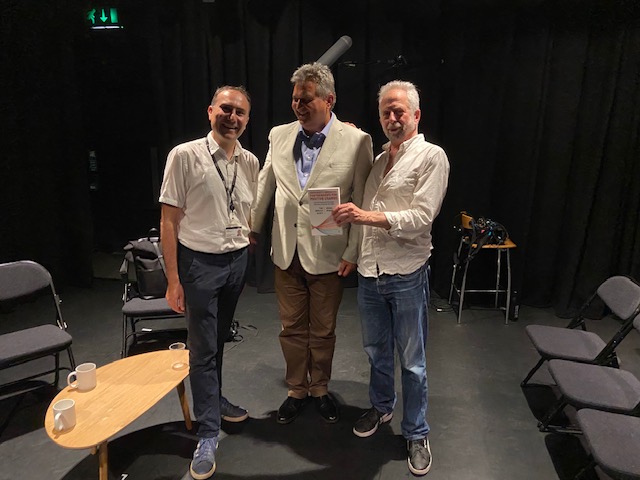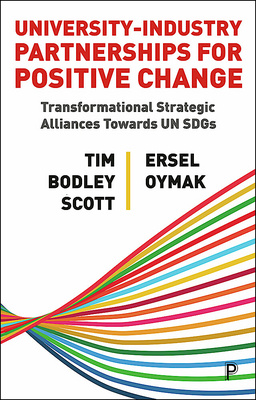Tasked by UCL with producing a short play on the challenges of collaborations between academia and industry, writer and director Adrian Jackson MBE turned to the pages of University–Industry Partnerships for Positive Change, as well as to the authors Tim Bodley-Scott and Ersel Oymak themselves, for inspiration and insight.
“Tim and Ersel’s combined experience of both fields, as amply told in their book, was an invaluable resource, especially combined with their entertaining anecdotes of their adventures trying to bridge this gap,” says Jackson.
Tim and Ersel’s innovative guide to making the most out of university–industry partnerships situates them as potentially revolutionary agents for change, able to collectively create sustainable wider social and global benefit. Jackson’s play, however, entertainingly highlights the other end of the spectrum, showing what happens when these partnerships are undertaken from the narrowest and most near-term perspective.

Left to right: Tim Bodley-Scott, Ersel Oymak and Adrian Jackson
His resulting piece, A Walk on the Wild Side, performed at UCL’s Bloomsbury Theatre, is a short provocative drama about a professor, a professional services person and an ex-colleague of the professor, now-turned industry professional.
The play opens at the end of a lecture given by Professor Peter Djanogly (played by Mark Down) about his latest research. Former colleague and now business high-flyer Ian Elliot (played by Craig Blake) approaches Professor Djanogly to offer him money for research that would be valuable to his company and which would enable the professor to retain a brilliant post-doc. A devilishly good offer.
The professor is excited at the prospect of funding and eager to proceed. The two agree to meet to iron out the details. The night before the meeting, Professor Djanogly calls professional services partnership advisor Janet McClennan (played by Beatrice Scricocchi) inviting her to join the following morning. It’s short notice but Janet obliges. However, the next morning, while Janet is getting coffee for Ian, the two men define the parameters of the deal in her absence. By the time she returns, the deal is done, and Ian Elliot needs to dash off to his next important business meeting. Frustrated with the situation, Janet expresses her displeasure and the professor storms out.
Before the third act, the drama is halted and the fourth wall broken. Jackson facilitates a discussion with the audience about the scenarios they have just witnessed. Funny, uncomfortable and realistic comes the feedback, as well as fundamentally underplaying the potential – of people, research and partnership – at every level.
The lights go up on the third act which is audience-led. Given their knowledge and experience, they are invited to take the roles previously performed by the actors and to resolve the story differently. On the second showing, Tim and Ersel, as authors of the books, were asked to make their stage debut to show everyone present how it should be done.
“That was quite a surprise to us”, says Ersel. “We had nothing prepared! Tim played the role of the professor and I was his ex-student, interested now in his research. In our new roles, we then had a stimulating conversation, based on the narrative in our book.”
“We tried to explain to people that the conversation needed to be more than a purely transactional one, focused only on a particular research contract”, says Tim. “Instead, we’re proposing setting up a relationship with a much broader lens and much higher ambitions: how can we change the world for the better together?”
Commissioned by the Academic Careers Office at UCL, the play was well received by more than 80 people over two showings, but that’s not the end of the run for Tim and Ersel’s story.
The play is just one of multiple ways in which University–Industry Partnerships for Positive Change is having an impact. In addition to a plethora of articles for mainstream publications such as the Times Higher Education, Tim and Ersel are themselves engaging and collaborating in several different partnerships.
The book has received positive feedback from around the world as well as closer to home: ASTP, Europe’s premier association of Knowledge Transfer professionals, has requested a masterclass which will run in December 2023. The authors have also been invited to the West London Chamber of Commerce to speak about AI as an enabling technology and partnerships around AI.
Tim and Ersel also discussed their ideas at the UN General Assembly Science Summit earlier this year in a conversation moderated by Dr Sionade Robinson, Vice President, City, University of London.
All the world may indeed be a stage and Tim Bodley-Scott and Ersel Oymak are determined to help make the players understand just what a vital societal difference we can make by working in partnership together.
The foreword, preface and first chapter are free to read at the Bristol University Press website here.
Tim Bodley-Scott is Strategic Alliances Director at University College London within the Computer Science department, where he develops transformational strategic alliances with key industry and academic partners.
Ersel Oymak is Strategic Alliances Advisor and Innovator in Residence for UCL and Board Member for Praxis Auril. He was formerly Head of Strategic Alliances Directors and Corporate Relationships for UCL and an Advisory Board Member at Hounslow Chamber of Commerce. He has significant global technology sector experience with leading corporates including CISCO, working closely with government, industry and start-ups.
Rebecca Megson-Smith is a writer and writing coach, founder of Ridley Writes.
 University–Industry Partnerships for Positive Change Edited by Olivier Sykes and John Sturzaker is available here for £19.99 on the Bristol University Press website.
University–Industry Partnerships for Positive Change Edited by Olivier Sykes and John Sturzaker is available here for £19.99 on the Bristol University Press website.
Bristol University Press/Policy Press newsletter subscribers receive a 25% discount – sign up here.
Follow Transforming Society so we can let you know when new articles publish.
The views and opinions expressed on this blog site are solely those of the original blog post authors and other contributors. These views and opinions do not necessarily represent those of the Bristol University Press and/or any/all contributors to this site.


